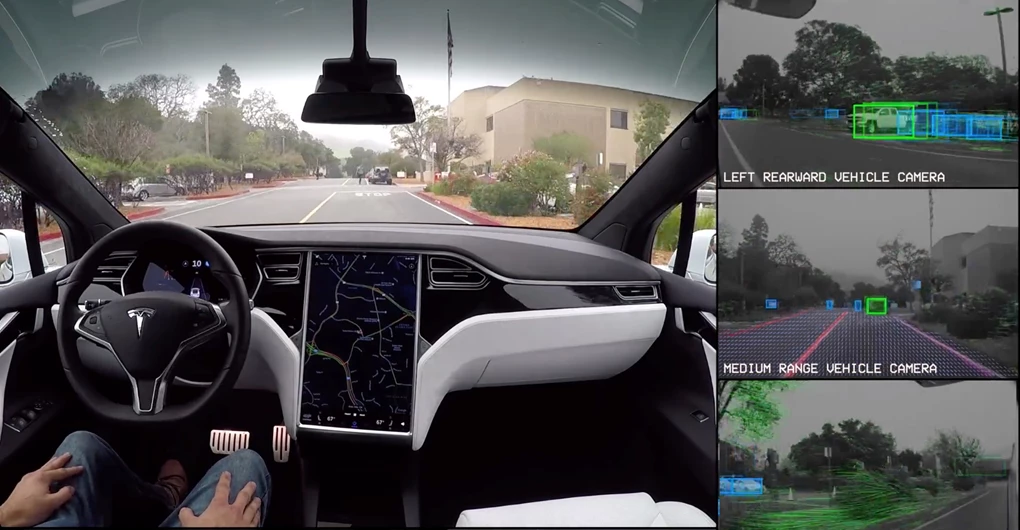In today’s new car market, the manufacturer Tesla Motors and autonomous cars are both hot topics of discussion.
Tesla itself has invested a lot of time and money into semi-autonomous driving aids, which the car manufacturer aims to evolve into fully autonomous driver aids in the future. Relevant to this is something called Tesla Autopilot, also known as Enhanced Autopilot to give it its full name. In this guide, we explain exactly what Tesla Autopilot is, how it works and what cars come with Autopilot.
What is Tesla Autopilot?
Autopilot is the name Tesla has given to its range of semi-autonomous driving aids which can help out and possibly even take over full control from the driver in certain situations. When someone sees the word autopilot, they usually think of a vehicle that can control itself with input from humans.
For the time being, the driving aids which are part of Tesla Autopilot have not yet transformed cars into fully autonomous vehicles. However, as Tesla adds constant improvements to its driving aids (often through software updates), the company takes more and more steps closer towards providing a car that can drive fully autonomous in virtually all situations.
How does Tesla Autopilot work?
In short, Tesla Autopilot utilises technology created by the company Mobileye in order to create a digital image of the space surrounding the car.
A car with Autopilot is equipped with an array of cameras and radar sensors plus a black box and these combined with some complex algorithms allow the car to analyse in detail what is on the road ahead.
Not only can the technology see what’s on the road, it can also use its data to create the optimum driving path, taking into account what other cars, cyclists, road signs and other objects are on the road.
Tesla Autopilot features
Tesla Autopilot currently comprises of four main semi-autonomous driving features:
Autosteer
Autosteer allows the driver to let go of the wheel and let the car take charge of steering by itself while on a motorway or dual carriageway lane. The Tesla will use radar cruise control and autonomous braking to keep a safe distance from any car in front. Autosteer can make a car brake from 70mph to a standstill if necessary.

Tesla drivers can activate Autosteer by pressing the cruise control lever twice and the function is deactivated when the brake pedal is used by the driver.
Auto Lane Change
A Tesla with Autopilot is capable of changing lanes on a motorway or dual carriageway by itself thanks to Auto Lane Change. The function itself is driver-instigated, however, as the system requires the driver to turn on the relevant indicator when they have Autopilot engaged and want to switch lanes.
The Auto Lane Change function will allow the Tesla to change lanes by itself when the car’s sensors indicated that such a manoeuvre appears safe. Tesla does recommend that drivers check their surroundings anyway before activating a lane change.
Automatic Emergency Steering
With this function, the Tesla utilises side collision sensors to monitor if any other vehicles are coming too close and will take evasive action by controlling the steering to swerve away from the danger.
If Automatic Emergency Steering is activated, the car will sound an alert instructing the driver to retake control of the steering wheel.
Autopark
This part of Tesla’s Autopilot means that the car can also use its vast array of senses to detect when a suitable parking space (whether that’s a parking bay or parallel parking spot) is nearby.
When a suitable parking spot is found, the driver can then choose to have their Tesla take control so it can park the car itself.
Tesla Autopilot cost
In the UK, adding Enhanced Autopilot to a Tesla car you plan to order is a £5,000 option.
If you want to add this upgrade to a Tesla that has already been delivered, the cost of the option is increased to £6,000.
Which Tesla cars have autopilot?
All current models which Tesla sells are available with the option of Tesla Enhanced Autopilot.
It is a feature which can realistically be expected to be included as an option or even a standard feature on upcoming new models launched by Tesla in the future.




